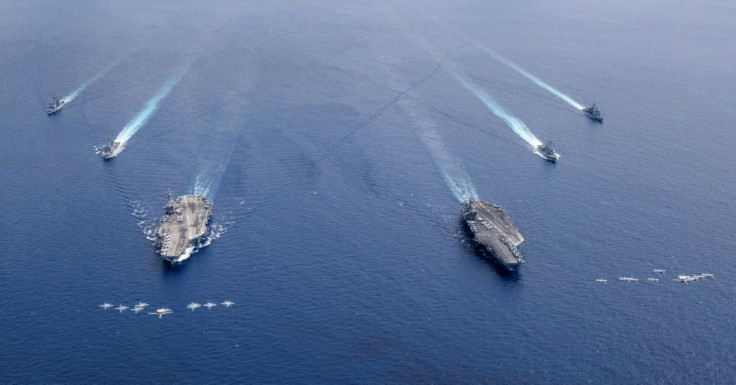USS Reagan Carrier Group Heads For South China Sea, Pact With Philippines To Stay
KEY POINTS
- US Navy calls it a routine mission in the South China Sea
- China had often protested US presence in the waterway
- US gains from Manila's move to continue major security pact
In a bid to step up military presence in the South China Sea, the U.S. Navy has sent aircraft carrier USS Ronald Reagan to the disputed waterway.
In a statement, the US Navy said the carrier group is being accompanied by guided-missile cruiser USS Shiloh and guided-missile destroyer USS Halsey.
Though the U.S. Navy claims "carrier operations in the South China Sea are part of (its) routine presence in the Indo-Pacific," this comes at a time when Beijing is on an overdrive to claim most of the South China Sea.
"While in the South China Sea, the strike group is conducting maritime security operations, which include flight operations with fixed and rotary wing aircraft, maritime strike exercises, and coordinated tactical training between surface and air units," the U.S. Navy said in a statement.
Stressing that "freedom of the seas in the South China Sea is vitally important," the statement added that the strike group is committed to "upholding U.S. security agreements with regional allies and partners, as well as demonstrating the capability of forward-deployed naval forces to quickly respond to any contingency across the region."
Last month, destroyer USS Curtis Wilbur had sailed near the Chinese-controlled Paracel Islands, irking Beijing. While U.S. Navy called it a "freedom of navigation" operation, Beijing reacted saying the ship illegally entered its territorial waters.
PLA had then called U.S. actions "unprofessional and irresponsible which demonstrates that the U.S. is an out-and-out South China Sea security risk creator."
Meanwhile, in a move favorable to the U.S., the Philippines has further delayed its plan to scrap a major troop pact with the United States.
According to The Military Times, Philippine President Rodrigo Duterte Monday suspended the abrogation of the Visiting Forces Agreement for another six months. The 1998 Agreement allows American forces to train in the country with Philippine troops. It also lays down the legal terms for their temporary stay.
"The president conveyed to us his decision to extend the suspension of the abrogation of the Visiting Forces Agreement by another six months while he studies and both sides further address his concerns regarding particular aspects of the agreement," Philippine Foreign Secretary Teodoro Locsin Jr was quoted by The Military Times.
The report added that Duterte has asked for more aid and coronavirus vaccines in exchange for retaining the accord.
Duterte had notified the United States on Feb. 12, 2020, that the pact would end in 180 days. He was reportedly annoyed at the U.S. for canceling the visa of his loyal ally Sen. Ronald dela Rosa. Rosa was linked to human rights violations in connection with Duterte's deadly anti-drug crackdown in 2016.
Ever since he assumed power, Duterte has insisted on warmer relations with Beijing, even announcing 'separation' from the United States. But, China's recent aggression against the island nation has turned the tide in favor of the United States.

© Copyright IBTimes 2024. All rights reserved.





















